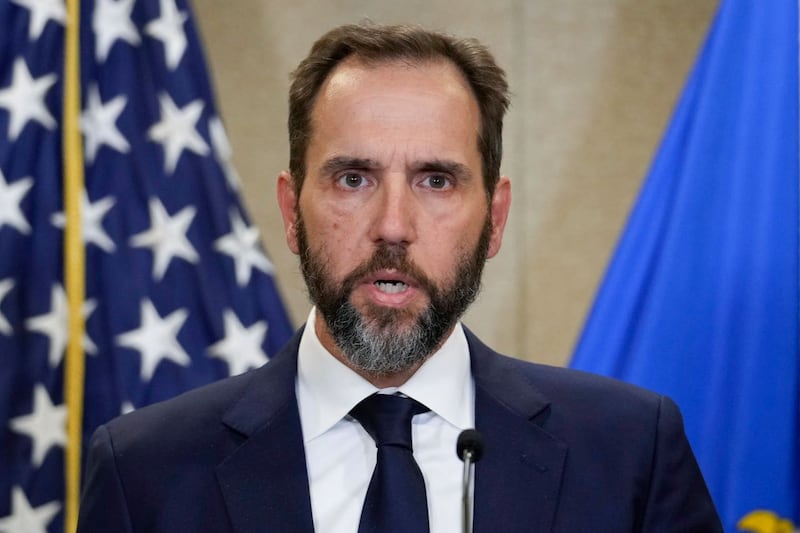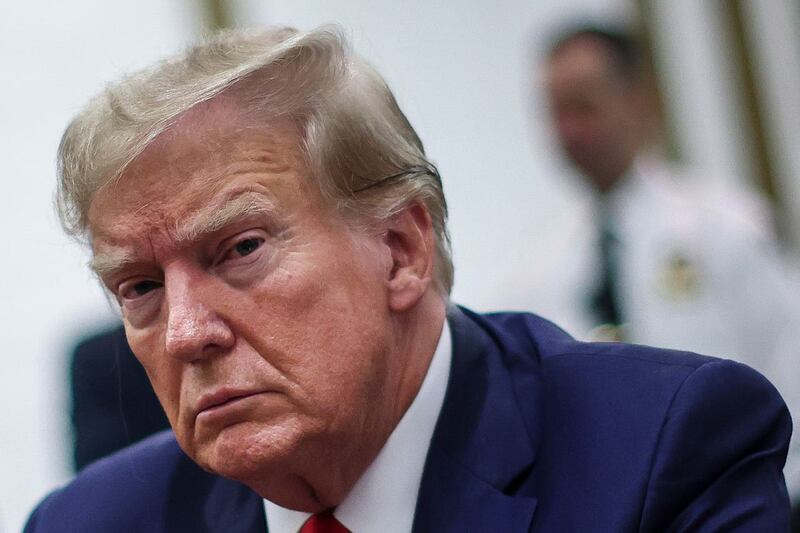A federal appeals court in Washington has largely upheld a gag order on former president Donald Trump in his 2020 election interference case, but narrowed the restrictions on his speech.
The three-judge panel’s ruling modifies the gag order to allow the Republican 2024 presidential front-runner to make disparaging comments about special counsel Jack Smith, but it reimposes a bar on speech about court staff and limits what he can say about known or reasonably foreseeable witnesses in the case.
The unanimous ruling is mostly a win for Mr Smith’s team, with the judges agreeing with prosecutors that Mr Trump’s often-incendiary comments about participants in the case can have a damaging practical impact and rejecting claims by defence lawyers that any restrictions on the ex-president’s speech amounted to an unconstitutional gag order.
It lays out fresh parameters about what Mr Trump can and cannot say about the case as he both prepares for a March trial and campaigns to reclaim the White House.

“Mr Trump’s documented pattern of speech and its demonstrated real-time, real-world consequences pose a significant and imminent threat to the functioning of the criminal trial process in this case,” Judge Patricia Millett wrote for the court, noting that many of the targets of Mr Trump’s verbal jabs “have been subjected to a torrent of threats and intimidation from his supporters”.
Though Mr Trump has a constitutional right to free speech, she noted, he “does not have an unlimited right to speak”.
Even so, the court took steps to narrow the gag order imposed in October by US District Judge Tanya Chutkan, which in addition to barring inflammatory comments about Mr Smith and court staff also restricted Mr Trump’s right to target witnesses.
The judges ruled that that part of the order was overly broad, freeing Mr Trump to talk to or about potential witnesses – including about their books, interviews and political campaigns – provided that the comments are not about those people’s potential participation in the investigation or trial or about the content of any expected testimony.
“The interest in protecting witnesses from intimidation and harassment is doubtless compelling, but a broad prohibition on speech that is disconnected from an individual’s witness role is not necessary to protect that interest, at least on the current record,” the court wrote.
“Indeed,” the opinion says, “public exchanges of views with a reasonably foreseeable witness about the contents of his forthcoming book are unlikely to intimidate that witness or other potential witnesses weighing whether to come forward or to testify truthfully.”

In a social media post responding to the ruling, Mr Trump said his team would appeal, and he complained anew about restrictions on his speech.
“In other words, people can speak violently and viciously against me, or attack me in any form, but I am not allowed to respond, in kind,” he said. “What is becoming of our First Amendment, what is becoming of our Country?”
Judge Chutkan, who was appointed by former president Barack Obama, imposed the gag order following a request from prosecutors, who cited Mr Trump’s pattern of incendiary comments.
The prosecutors said restrictions were necessary to protect the integrity of the case and shield potential witnesses and others involved in the case from harassment and threats inspired by Mr Trump’s incendiary social media posts.
The order has had a back-and-forth trajectory through the courts since prosecutors proposed it, with the US Court of Appeals for the DC Circuit lifting the gag order while it considered Mr Trump’s challenge.
The case accuses Mr Trump of plotting with his Republican allies to subvert the will of voters in a desperate bid to stay in power in the run-up to the riot by his supporters on January 6 2021. It is scheduled to go to trial in March in Washington’s federal court, just blocks away from the US Capitol.
The special counsel has separately charged Mr Trump in Florida with illegally hoarding classified documents at his Mar-a-Lago estate after he left the White House following his 2020 election loss to Democrat Joe Biden. That case is set for trial next May, though the judge has signalled that the date might be postponed.
Mr Trump has denied any wrongdoing and has claimed the cases against him are part of a politically motivated effort to keep him from returning to the White House.







